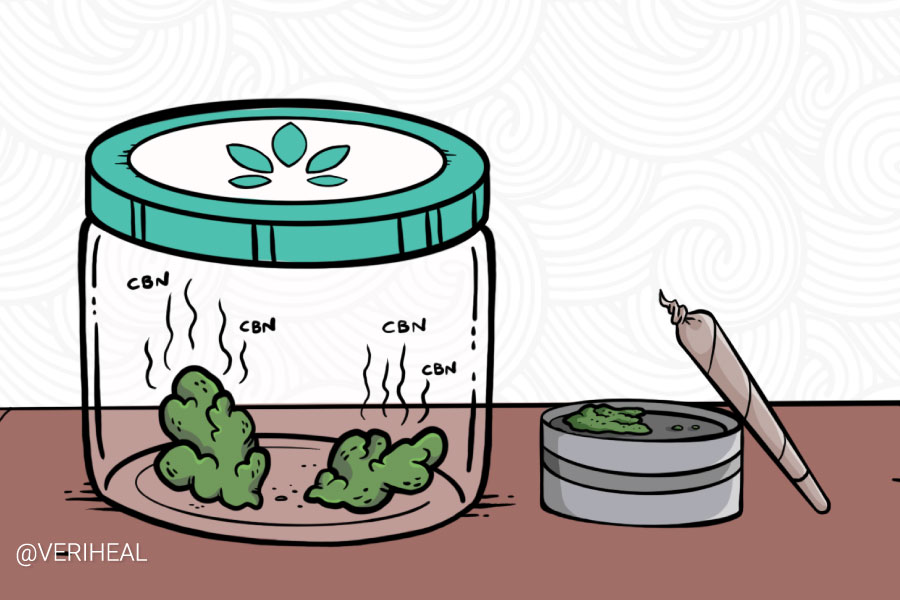While digging for natural sleep solutions, you may have come across products that contain cannabinol (CBN), a cannabis compound that’s been dubbed “the sleepy cannabinoid” due to its potential as a sleep aid. Just like THC and CBD, CBN interacts with the body’s endocannabinoid system (ECS) and may provide numerous benefits. But just how effective is it at helping consumers catch some z’s, and what else can it do? Let’s find out.
- What Is the Cannabinoid CBN?
- What Sets CBN Apart From CBD?
- Does CBN Help With Sleep?
- Other Potential Benefits of CBN
- Anticonvulsant
- Antibacterial
- Anti-inflammatory
- Appetite Stimulant
- Pain Reliever
- Final Takeaway
What Is the Cannabinoid CBN?
CBN is a compound found naturally in the cannabis plant, otherwise known as a phytocannabinoid. A little-known fact is that contrary to popular belief, CBN was actually the very first phytocannabinoid to be isolated back in 1896.
It is technically psychoactive, which simply means it affects the mind. However, CBN is only mildly intoxicating—its effects are thought to be between 1/10 and 1/4 as potent as the “high” effects brought on by THC, so consumers are unlikely to feel distinct cognitive changes after ingesting it. This is because of weaker binding to both CB1 and CB2 receptors.
CBN actually begins its life as a cannabinoid acid called cannabigerolic acid (CBGA), which then becomes THCA. You may be familiar with THCA, as it’s also the predecessor of THC. In order for THCA to convert to THC, cannabis flower must be decarboxylated with heat (this is why we smoke cannabis or bake it before using it in edibles).
CBN, however, is formed over time as THC is exposed to oxygen, UV light, and heat. For this reason, CBN is mostly found in aged cannabis following long periods of storage—even under ideal storage conditions—as opposed to fresh flower.
Although CBN does not exactly replicate the potent highs produced by THC, many seek it out for its potential therapeutic benefits—one of the most well-known being its sedating properties. Because it’s not receiving as much interest from researchers as CBD and THC, these benefits are still largely speculative. That said, several studies support various uses of CBN and justify the need for further research to unlock the full potential of this cannabinoid.
What Sets CBN Apart From CBD?
CBD and CBN may share similar namesakes, but they are actually quite different. Both are psychoactive cannabinoids found in cannabis and hemp (a fibrous subspecies of cannabis containing less than 0.3% THC) that are derived from CBGA and potentially offer relief from pain and inflammation. Research has uncovered some similar uses between them, but the likeness mostly ends there.
For more information on CBD, or cannabidiol, check out The Complete Guide to CBD: Everything You Need to Know About Cannabidiol
CBD has been much more thoroughly researched and is proven to have anti-inflammatory, anxiolytic, anticonvulsant, and analgesic properties, making it a common relieving agent for anxiety, epilepsy, and chronic pain, among others. While some studies have pointed to CBN also having potentially anti-inflammatory, analgesic, and anticonvulsant properties, most existing research has explored its ability to sedate and promote sleep.
Here are some of the main ways that CBN and CBD stand apart from each other:
- CBD is much more widely available and affordable, particularly due to its significant quantities in hemp plants.
- CBD is currently better understood and more researched than CBN.
- CBD is formed by the decarboxylation of CBDA, while CBN is formed by the oxidation of THC.
- The FDA has approved one CBD-based medication for the treatment of epilepsy/seizures, while CBN has not been approved by the FDA for any use.
- Both are technically psychoactive, but CBD is completely non-intoxicating while CBN produces very mild mind-altering effects.
- CBN has been shown to stimulate appetite, whereas CBD has been shown to reduce appetite.
While CBN and CBD each offer unique benefits and effects, it’s likely that they complement each other well when combined. This is due to a phenomenon known as the entourage effect, which theorizes that cannabinoids work synergistically to amplify each other’s effects when consumed together. For example, a 2019 study found that CBN and CBD worked together to reduce pain in rats more than either compound alone, demonstrating the entourage effect.
Does CBN Help With Sleep?
Many companies are promoting CBN products as sleep aids, but does CBN actually work to combat insomnia and sleeplessness? Unfortunately, the jury’s still out on this one.
While many anecdotal reports support the use of CBN to promote sleep, some studies have found little evidence of its supposedly sedating effects on its own. The limited amount of research available also makes it difficult to draw any definitive conclusions about the cannabinoid, although it appears to work better in combination with other cannabinoids like THC when it comes to sleep.
In a 1975 clinical trial, researchers administered various amounts of THC and CBN to five male participants. The participants experienced stronger sedative effects from ingesting THC and CBN together than they did on THC alone. Results also showed that THC increased the participants’ heart rates while CBN did not, supporting CBN’s potential as a sedative. The trial’s findings are promising but far from conclusive due to its age and small sample size.
Some studies have explored the effects of CBN with rodents, procuring enlightening but ambiguous results. A 1975 study in which various ratios of THC and CBN were administered to rodents found that CBN prolonged the subjects’ barbiturate-induced sleep time. Similarly, a 1995 study discovered that synthetic CBN extended the sleep time of mice. According to clinical psychologist Michael J. Breus, these studies “…are indications that CBN is a powerful sedative.”
Overall, though, the existing research on CBN is still rife with gaps. Prof of Pot points to a handful of unclear/unsound CBN studies, stating that “very little of the extensive research on CBN actually supports” claims. A 2021 literature review of CBN research dating back to 1945 reached the same conclusion. Both sources assert that modern randomized controlled trials (RCTs) are critical to uncovering the truth about CBN’s capabilities.
Some experts offer the theory that while aged cannabis anecdotally has sedating effects, CBN might not necessarily be responsible for this. According to cannabis researcher Dr. Ethan Russo, aged cannabis has a higher quantity of a class of terpenes called sesquiterpenoids compared to fresh cannabis. These aromatic compounds have been found to promote sedation. In other words, CBN’s existence in sleep-inducing aged cannabis could be a coincidence.
Other Potential Benefits of CBN
CBN has been found to potentially offer other benefits, and some researchers even speculate that these other effects could be the real reason behind CBN’s sleep-promoting abilities. Dr. Raminder Mulla explains, “Although direct evidence of CBN enhancing sleep is lacking, it may promote sleep indirectly through reducing psychological arousal (caused by sources of stress, pain, etc.) at bedtime.”
The following are some of the earliest researched—but not definitively proven—effects of CBN on the human body.
Anticonvulsant
A 1973 study that compared the effects of THC, CBD, and CBN on mice demonstrated that CBN has the potential to reduce seizures and epileptic symptoms. However, CBN was found to be less effective for this purpose than the other two cannabinoids included in the study.
Antibacterial
CBN could have the ability to fight off bacteria, even multiple kinds of bacteria resistant to traditional antibiotics. In a 2008 study, CBN was found to be effective at fighting off strains of methicillin-resistant Staphylococcus aureus (MRSA), a bacterial infection resistant to most antibiotics. Based on these preliminary findings, CBN could be useful for healing other infections as well pending further investigations.
Anti-inflammatory
Studies have also pointed to CBN’s potential to treat inflammation. In a study involving rats, CBN was found to reduce inflammation caused by collagen-induced arthritis. A 2003 study with mice similarly discovered that CBN played a role in decreasing allergen-induced mucus production, meaning that it could be used to treat inflammation-fueled airway diseases like asthma.
Appetite Stimulant
As mentioned earlier, CBN is similar to THC in its ability to stimulate appetite. In a 2012 study, rats given CBN significantly increased their food intake compared to rats given CBD. The report’s authors concluded that CBN could be used in place of THC for patients in need of appetite stimulation who are interested in avoiding THC’s psychotropic effects.
Pain Reliever
Some evidence supports CBN’s analgesic, or pain-relieving, capabilities. A 2002 study with rodent subjects showed that CBN can reduce pain by triggering the release of sensory neuropeptides within the body. Another rodent study from 2019 found that CBN, particularly when combined with CBD, was effective at reducing myofascial pain.
Other studies have explored CBN’s role in delaying the onset of ALS, decreasing cell damage and acting as an antioxidant in a cell culture model of Huntington’s disease, treating glaucoma, and stimulating bone growth. CBN may be the sleepy cannabinoid, but its medical benefits are similar to other cannabinoids and thus likely extend way beyond sedation.
Final Takeaway
Even with the existing evidence pointing to CBN’s sleep-inducing qualities, much more research is needed to back hard claims about this mildly intoxicating cannabinoid. However, there is no evidence that CBN counteracts or prohibits sleep, so it’s a viable option for people who don’t respond to traditional sleep aids—which are generally more harmful than cannabinoids. Additionally, early research supports CBN’s potential to provide a number of other therapeutic benefits, such as pain relief and appetite enhancement.
If you’re interested in using CBN to alleviate symptoms of insomnia or another condition, talk to a medical marijuana doctor about setting up a treatment plan.
Note: The content on this page is for informational purposes only and is not intended to be professional medical advice. Do not attempt to self-diagnose or prescribe treatment based on the information provided. Always consult a physician before making any decision on the treatment of a medical condition.
This article was originally written by Kat Helgeson and published on 4/15/20. Updated on 1/11/22.
Author, Share & Comments








